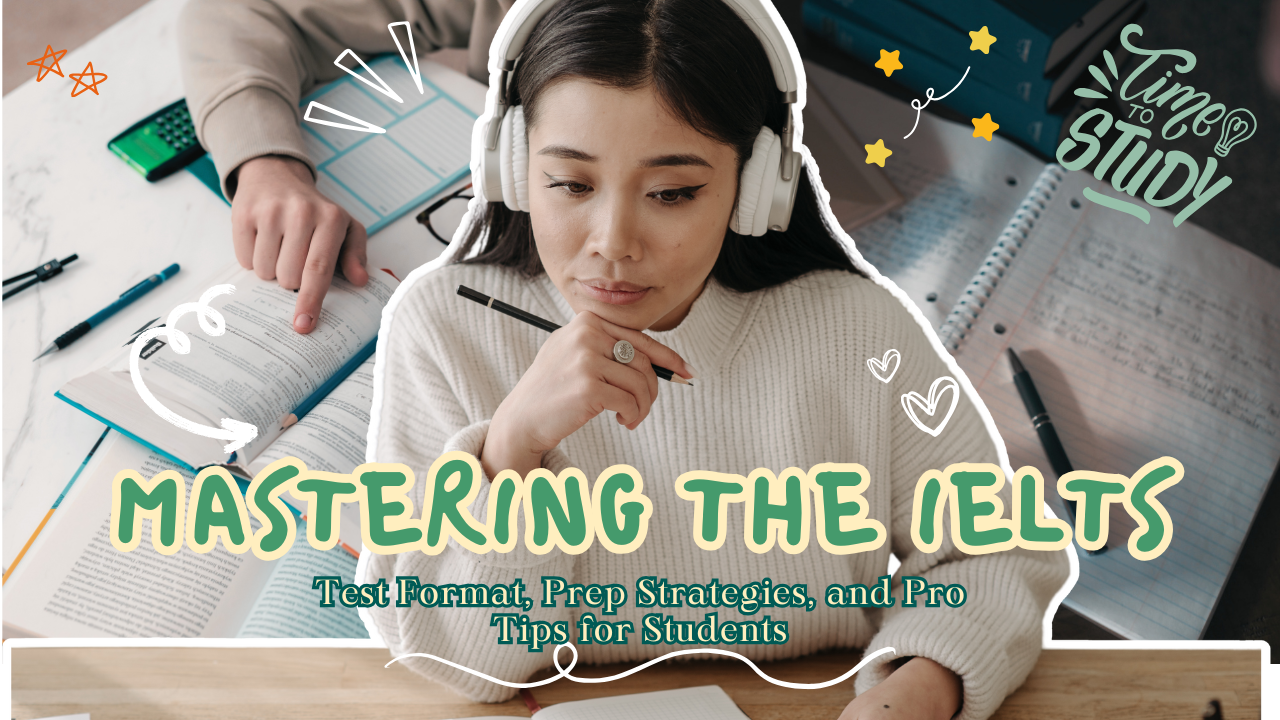A Student’s Guide to Acing the IELTS Exam
Sitting at your desk, fingers hovering over the “Book Now” button for the IELTS test… you pause. Wait, do you actually know what you’re signing up for?
If you’re dreaming of studying in the UK, Canada, Australia, or the US, chances are someone, maybe a teacher, a friend, or your study abroad consultant, has mentioned the IELTS. But let’s break it down: what is it, really?
The International English Language Testing System (IELTS) is one of the most trusted ways to prove your English skills to universities and immigration offices. This blog is your no-stress, student-friendly guide to understanding the IELTS from start to finish. We’ll walk you through what the test looks like, how to choose the right version (Academic or General Training), and how to prep smart.
Now, we get it. Between schoolwork, college applications, and maybe even a part-time job, prepping for a big test like IELTS can feel overwhelming. But don’t worry, we’ve built this guide with you in mind. Let’s dive in and make IELTS feel a little less intimidating and a lot more doable.
IELTS Basics: What You Need to Know
Before we dive into IELTS prep strategies and study hacks, let’s cover the basics. Because let’s be honest, prepping for a test is way easier when you actually know what you’re dealing with.
So… What Is the IELTS Test?
Imagine this: You’re planning to study in the UK, Canada, Australia, or the US. You’ve got your dream university picked out, your course bookmarked, and then you hit a requirement: IELTS.
The International English Language Testing System (IELTS) is one of the most widely accepted English proficiency tests out there. It checks how well you can listen, read, write, and speak in English. The test is not just for students; employers, immigration offices, and professional bodies all use it to assess language skills.
Here’s why it matters:
- Accepted by 11,000+ institutions worldwide
- Required by top universities and visa authorities
- Taken by over 3.5 million people every year
Basically, it’s your ticket to studying, working, or living in an English-speaking country.
IELTS Academic vs. General Training: Which One’s for You?
One of the first things students ask is: Do I take the Academic version or General Training? Great question.
Let’s break it down:
|
Feature |
IELTS Academic |
IELTS General Training |
|
Purpose |
University admissions, professional registration |
Immigration, work, or non-academic training |
|
Reading & Writing |
Academic texts, essays |
Everyday language, practical writing tasks |
|
Who should take it? |
Students applying to college or university abroad |
People migrating or applying for jobs/training abroad |
Here’s the shortcut:
- If you’re applying for a bachelor’s or master’s degree, go with IELTS Academic.
- If you’re planning to immigrate or take up non-academic training, IELTS General Training is your match.
Example: A student applying to the University of Toronto needs IELTS Academic. But someone moving to Canada for work through Express Entry? They’ll likely need IELTS General Training.
Still unsure which version fits your goals? Check out our full breakdown in this blog on IELTS academic vs general training for a deeper dive and real-world examples.
What’s the Deal with IELTS Band Scores?
Okay, so how do they actually score this thing?
IELTS uses a band scale from 0 to 9. Each section: Listening, Reading, Writing, and Speaking, gets its own score, and then you get an overall band score (basically the average).
Here’s a quick cheat sheet:
|
Band Score |
English Level |
What It Means |
|
9 |
Expert User |
You’re fluent, accurate, and confident |
|
8 |
Very Good User |
Minor slip-ups, but solid overall |
|
7 |
Good User |
Strong grasp with a few errors |
|
6 |
Competent User |
Can communicate, but might misunderstand |
|
5 |
Modest User |
Basic English, limited accuracy |
|
Below 5 |
Limited to Non-User |
Struggles with communication |
Heads-up: Most universities want a score between 6.5 and 7.5. Immigration requirements vary depending on the country and visa type.
Your score isn’t just a number, it’s a reflection of how well you’ll thrive in an English-speaking environment. So yes, prep matters!
Section 2: The Four IELTS Test Sections Explained
The IELTS exam has four sections: Listening, Reading, Writing, and Speaking. Each one tests a specific skill you'll need for academic and real-life situations abroad. Here’s a quick breakdown:
Listening Test (30 minutes)
- Same for Academic & General Training
- 4 audio recordings: conversations, monologues, academic discussions
- 40 questions: multiple choice, matching, sentence completion, map labelling
- Only played once – so focus is crucial
Tip: Practice active listening and get a grasp on different English accents (British, Australian, etc.) as you only hear each recording once!
Reading Test (60 minutes)
- Different for Academic vs. General Training
- Academic: 3 long academic texts
- General Training: Shorter, practical texts (ads, manuals, letters)
- 40 questions: True/False/Not Given, matching headings, gap fills, etc.
- No extra time to transfer answers
Tip: Spend ~20 minutes per passage; practice skimming and scanning. No extra time to transfer answers, so manage your time wisely!
Writing Test (60 minutes)
- 2 tasks:
- Task 1:
- Academic: Describe a chart, graph, or process
- General Training: Write a formal or informal letter
- Task 2: Essay on a given topic (same for both tests)
- Task 1:
- Task 2 is worth more marks
Tip: Plan before you write, use a clear structure (intro, body, conclusion), and task 2 carries more weight, don’t leave it for the last minute!
Speaking Test (11–14 minutes)
- Same format for both test types
- Conducted face-to-face with an examiner
- 3 parts:
- Part 1: Personal questions (study, hobbies, etc.)
- Part 2: 1-minute prep + 2-minute talk on a given topic
- Part 3: Discussion based on Part 2’s topic
Tip: Speak naturally and clearly, don’t memorise the answer and don’t stress about having a perfect accent!
Want a deeper dive into each section with tips, examples, and prep strategies? Check out our full IELTS exam sections blog for everything you need to know!
Section 3: How to Prepare for IELTS
Preparing for the IELTS doesn’t have to feel overwhelming. With the right plan, the right resources, and a bit of daily effort, you can build your English skills and boost your confidence, all while juggling school or college life.
Build Your Study Plan
Prep time varies, so tailor your plan to your timeline:
- 6 Months: Start slow, focus on daily English exposure and build test strategies gradually.
- 3 Months: Practice two skills per week (e.g., Listening + Reading, then Writing + Speaking).
- 1 Month: Go intensive, take full IELTS mock tests, review mistakes, and sharpen your timing.
Weekly Study Snapshot |
||
|---|---|---|
|
Day |
Focus |
Time |
|
Monday |
Listening + Vocabulary |
1–1.5 hrs |
|
Tuesday |
Reading + Review |
1–1.5 hrs |
|
Wednesday |
Writing Task 1 + Grammar |
1–2 hrs |
|
Thursday |
Speaking Practice |
30–60 min |
|
Friday |
IELTS Practice Test + Review |
2 hrs |
|
Weekend |
IELTS mock test or weak area focus |
Flexible |
Mix all four skills weekly to stay balanced.
Top IELTS Exam Preparation Resources
- Books: Cambridge IELTS, IELTS Practice Tests Plus
- Websites: IELTS.org, IELTS Liz, IELTS Buddy
- Apps: British Council IELTS Prep, Magoosh
- YouTube/Podcasts: E2 IELTS, IELTS Energy, BBC Learning English
Pro Tip: Don’t just take tests; review your mistakes. That’s where the magic happens.
Test Day Checklist
Bring:
- Valid ID/passport
- Confirmation slip
- Pencils, erasers, and a sharpener
- Clear water bottle + snacks (if allowed)
Expect:
- Early arrival (30–45 mins)
- ID check + photo
- No electronics allowed
- Test order: Listening → Reading → Writing → Speaking (same or different day)
Final Tips:
- Sleep well the night before
- Eat light, stay calm
- Trust your prep, you’ve got this!
IELTS isn’t about perfection. It’s about clear, confident communication.
Want more smart strategies and prep hacks? Check out our full IELTS preparation tips blog for actionable advice that actually works.
Section 5: Pro Tips for Success
You’ve got the IELTS format down and a study plan in place, now let’s level up. These quick tips will help you prep smarter and score higher.
Smart IELTS Test Preparation Strategies
- Mix all four skills weekly, don’t just focus on one.
- Use real-world materials like podcasts, articles, and conversations.
- Train with different accents (UK, Aussie, Canadian)
- Take IELTS mock tests, but always review your mistakes.
- Don’t memorise answers, be natural.
- Highlight keywords to find answers fast
- Watch out for tricky “True/False/Not Given” questions
- Plan before you write; structure matters
- Talk out loud daily, even to yourself
- Skip the memorised scripts, be real
- Stay calm, sleep well, and trust your IELTS prep.
Avoid These Mistakes
- Starting too late
- Ignoring one section
- Skipping test reviews
- Overusing templates
Didn't get the score you hoped for? No worries, there is an IELTS retake option available as many times as you need. Just make sure to review your results and focus on the sections that need improvement before booking for another IELTS retake period.
Because IELTS isn’t about perfection, it’s about clear communication.
Should You Take an IELTS Test Preparation Course?
Yes, if you:
- Aim for a 7.5+ band score
- Struggle with Writing or Speaking
- Want expert feedback
No, if you:
- Prefer self-study
- Have a tight budget or schedule
Free tools like IELTS Liz, E2 IELTS, and British Council apps are great alternatives. And don’t forget, many study abroad consultants offer free workshops too!
IELTS Done Right: Step Into Your Study Abroad Adventure
IELTS isn’t just another test. It’s your gateway to studying in places like the UK, Canada, Australia, and beyond. And while the idea of IELTS prep, deadlines, and visa paperwork might feel overwhelming, you’re not in this alone.
With the right prep strategy and a little consistency, you can walk into your IELTS exam feeling confident and walk out one step closer to your dream university. And if you ever feel stuck or unsure about what comes next, that’s exactly where Uscholars steps in.
As a student-first study abroad consultancy, Uscholars helps you every step of the way, from IELTS exam preparation and university selection to applications and visas. Think of them as your personal guide to making study abroad simple, stress-free, and totally achievable.


